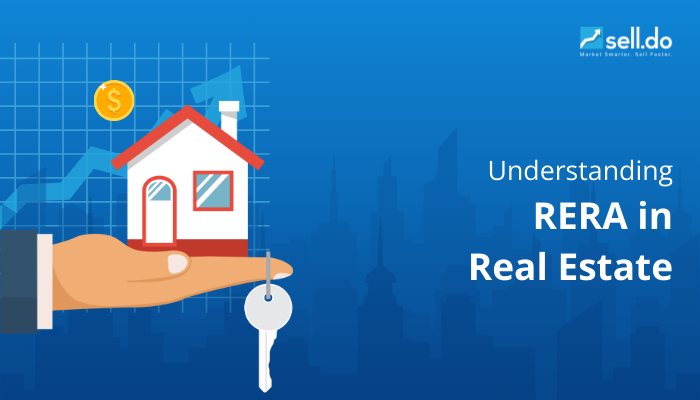If you're a real estate developer or a brokerage firm, you've likely felt the impact of new regulations. But what is RERA in real estate, and why is it a game-changer for your business? This landmark legislation is reshaping the real estate market, making it more transparent, accountable, and customer-focused. So, how can you use these changes to your advantage?
In this blog, we’ll break down what RERA is, its key functions, registration requirements, and penalties for non-compliance.
You'll also discover how a powerful CRM like Sell.Do can help you stay compliant, enhance customer interactions, and elevate your sales and marketing efforts. Let’s get started!
What is RERA in Real Estate?
If you're a real estate developer or a brokerage firm, understanding what RERA is can be a game-changer for your business. The Real Estate (Regulation and Development) Act, 2016, or RERA, was enacted to bring greater transparency and accountability to the real estate sector.
It protects homebuyers by ensuring developers meet deadlines, provide accurate information, and deliver as promised.
What Are the Rules Under the RERA Act?
RERA is designed to make real estate transactions fairer and more transparent. It serves two main purposes: protecting homebuyers' interests and regulating developers' practices. Understanding how RERA works is essential for real estate developers or brokerage firms to comply with regulations and build trust with clients.
Here’s what you need to know.
- Mandatory Registration: You must register any project over 500 square meters or with more than eight apartments with the Real Estate Regulatory Authority (RERA). This ensures you only market legitimate, approved projects, enhancing your credibility with buyers.
- Standardized Sales Agreements: RERA requires a standard format for sales agreements, eliminating confusing contract terms and ensuring clear communication with buyers, which builds trust and minimizes disputes.
- Timely Delivery: Under RERA, you must complete projects on time or face penalties. This commitment to deadlines enhances your reputation and provides buyers with confidence that they will receive their property as promised.
- Secure Use of Funds: RERA mandates that 70% of the funds collected from buyers must be kept in a separate escrow account for that specific project. This reduces the risk of fund diversion and assures buyers that their money is secure and used appropriately.
- Access to Information: You must make all project details — from layouts to progress updates — available online. This transparency empowers buyers with real-time information, enhancing trust and engagement.
Objectives of RERA
RERA was enacted on March 26, 2016, and came into force on May 1, 2017, to address issues like project delays, hidden charges, and misleading ads. Here’s what RERA aims to achieve.
- Hold Developers Accountable: You must comply with strict regulations and deadlines or face penalties, ensuring higher responsibility.
- Promote Transparency: You must disclose all critical details of your projects, such as approval status and completion timelines, allowing customers to make informed decisions.
- Protect Consumer Rights: Adhering to RERA guidelines enhances trust and credibility, offering buyers a safer and more reliable experience.
- Creation of a Regulatory Authority: RERA creates a dedicated regulatory body that functions independently to oversee the real estate market, enforce laws, and resolve disputes efficiently and effectively.
Every real estate project must be registered under RERA, with full disclosure of layout plans, government approvals, and progress status. Compliance ensures that your project stands out as credible and trustworthy, making it easier to attract and retain customers.
5 Key Features of the RERA Act

RERA introduces several key features that protect homebuyers and promote a fair, transparent, and secure real estate environment. Understanding these features is crucial for developers and brokers to build trust and ensuring compliance.
Here’s how RERA works to create a better experience for everyone involved.
-
Security: Allocation of 70% of Funds to a Special Account
One of your client's biggest concerns when buying property is the correct use of their funds. Under RERA, 70% of the money collected from buyers must be deposited into a dedicated escrow account, which can only be used for that project's construction and land costs.
This regulation prevents fund diversion to other projects, minimizes delays, and reassures clients that their investment is secure.
-
Transparency: Disclosure of Project Details and Timelines
RERA ensures that your clients have access to all critical details before they commit to buying a property. As a developer, you are required to provide comprehensive information about each project, including the following.
- Project Layout and Design Plans
- Government Approvals and Land Titles
- Completion Timelines and Construction Progress
This information must be uploaded to the RERA website and kept up to date. By maintaining transparency, you help your clients make informed decisions and eliminate any hidden surprises, building trust and credibility in your business.
-
Fairness: Standardized Carpet Area Calculation
Before RERA, varying methods to calculate the carpet area often created confusion and inflated prices for buyers. RERA standardizes this by defining carpet area as the net usable floor area within the walls of a property. This ensures buyers only pay for the actual space they will use, eliminating unclear or inflated measurements and fostering fairness and transparency in real estate transactions.
-
Quality: Rectification of Defects within 5 Years
Concerned about construction quality? RERA holds developers accountable for their work. If any structural defects or issues due to poor workmanship arise within five years of possession, the developer must fix them at no extra cost.
This protects your clients' investments and guarantees a high standard of quality for their new homes, enhancing trust in your projects.
-
Authorization: Mandatory Project Registration with RERA
RERA mandates that all real estate projects above a certain size be registered with the Real Estate Regulatory Authority. This registration requires developers to disclose complete project details, including approvals, financial status, and timelines for completion.
This process protects your clients from fraudulent projects, ensuring they are dealing with credible and authorized developers.
Key Functions of RERA
Understanding what RERA is in real estate involves knowing its core functions and the benefits it provides to all stakeholders. Here’s a quick overview of how RERA works and helps you.
- Regulation and Registration of Projects and Agents: RERA mandates that all real estate projects above 500 square meters or with more than eight apartments, as well as all real estate agents, must be registered with the respective state authority. This ensures you are dealing with verified projects and legitimate agents.
- Maintenance of Records for Public Review: RERA maintains a public database listing all registered projects and agents. This lets you check project details, developer credentials, and approval status online, helping you make informed decisions based on verified data.
- Regulating Advertisements and Disclosures: RERA enforces strict rules on project advertisements. Developers must include the RERA registration number in all promotional materials and provide accurate information about the project’s status, approvals, and completion timelines, protecting you from misleading advertisements.
- Consumer Grievance Redressal Mechanism: If you face issues such as delays, quality concerns, or false promises, RERA provides a platform for filing grievances. The authority ensures that your concerns are addressed promptly and fairly.
What is the Process of RERA Registration?
To truly grasp RERA's role in real estate, it's crucial to recognize that it mandates the registration of all qualifying projects. This requirement ensures transparency, keeps buyers informed, and offers protection against potential malpractices by developers.
Here are the key registration requirements under RERA that developers must meet to ensure compliance and credibility in the market.
Project Registration Criteria
RERA mandates that any real estate project meeting specific criteria must be registered to ensure transparency and legitimacy:
- Size and Scope: Projects larger than 500 square meters or with more than eight apartments must be registered with the state’s Real Estate Regulatory Authority (RERA).
- New and Ongoing Projects: Both new projects and those still under construction when RERA came into effect require registration.
- Exemptions: Projects under 500 square meters, with fewer than eight units, or intended for personal use are typically exempt.
These criteria ensure that only legitimate projects reach the market, reducing the risk of fraud for homebuyers.
Steps for Project Registration and Compliance
Here are the simple steps for project registration under RERA:
- Eligibility Criteria for Projects: Projects must meet specific criteria to qualify for RERA registration, such as being over 500 square meters in size or having more than eight apartments. All new and ongoing projects meeting these criteria must be registered before being marketed or sold.
- Document Collection and Application Process: Developers need to gather and submit various documents, including project plans, land title details, approval certificates, and information about the developer's background. (Read ahead for more details about this in the next section.)
- Payment of Registration Fees and Compliance Monitoring: Developers must pay a registration fee, which is determined by the state. After registration, RERA continuously monitors the project to ensure compliance with regulations and timelines.
Documentation and Fee Submission Process
To register a project under RERA, developers must follow a detailed submission process, as mentioned below.
- Project Details: Submit layout plans, timelines, and information on all facilities offered.
- Approvals and Ownership Proof: Provide copies of all government approvals and land title documents.
- Developer Information: Include background details, track record, and financial standing.
- Financial Statements: Present audited financials and details of funds allocated for project completion.
- Payment of Fees: Pay a registration fee, which varies depending on the state and project size.
After submitting these documents and fees, and upon approval, the project is assigned a unique RERA registration number, which must be displayed in all advertisements and sales documents.
State-Specific Rules and Compliance
Since RERA is a central law enforced by individual states, the specific registration rules and fees can vary.
- Fee Structures: Each state determines its registration fees, which can differ based on the size and type of the project.
Here's a breakdown of the RERA registration fees for various states in India.
| State | Residential Projects | Commercial Projects |
| Uttar Pradesh | Rs. 10 per sq. meter (up to 1,000 sq. meters) | Rs. 500 per 100 sq. meters (beyond 1,000 sq. meters) |
| Delhi | Rs. 10,000 | Rs. 50,000 |
| Maharashtra | Rs 10,600 | Rs. 1,00,600 |
- Additional Requirements: Some states may have extra conditions, such as local approvals or additional documentation.
- Local RERA Authority: Every state has its own Real Estate Regulatory Authority responsible for overseeing compliance and enforcing rules.
These state-specific variations mean developers must be aware of the rules that apply in their specific location.
While adhering to government-specific rules and compliances, businesses also need a unified platform to manage their operations. For this, we recommend Sell.Do, a Real Estate CRM that lets you efficiently manage marketing campaigns, inventory, sales, and customer relationships all from one platform.
Benefits for Stakeholders: How RERA Works for You?
RERA ensures you receive transparent information, timely project delivery, and adherence to quality standards, reducing the risk of delays and financial loss. Here are additional benefits.
- Standardization for Developers: Developers must comply with standardized regulations, such as using a uniform method for calculating carpet area and passing strict quality checks. This levels the playing field and builds trust with buyers.
- Reduced Risk for Investors: RERA requires that 70% of project funds be deposited in a dedicated escrow account, which can only be used for that specific project. This safeguards your investment by minimizing the risk of fund diversion or misuse.
- Grievance Redressal: RERA offers a dedicated mechanism for handling buyer, investor, and developer complaints and disputes. This process ensures that all parties have a fair opportunity to voice concerns and receive timely resolutions.
What are the Penalties under the RERA Act?
To fully understand RERA in real estate, it's crucial to know about its penalties, registration steps, and overall impact on the industry.
Here's a breakdown of the penalties under RERA and what it means for you.
- Penalties for Non-Compliance (Buyers, Promoters, Agents): RERA imposes strict penalties on anyone who does not comply with its regulations. Developers or promoters who fail to register their projects with RERA can face fines of up to 10% of the project’s estimated cost.
- Imprisonment and Fines for Serious Violations: RERA can impose hefty fines or even imprisonment for serious violations, like providing false information or repeated non-compliance. Developers can face up to three years in prison, while agents and buyers can face up to one year for non-compliance.
- Consequences of Registration Revocation: If RERA revokes a project’s registration due to serious violations, it bars developers from accessing the project’s escrow account. RERA can take control of the project or appoint a new developer to ensure its completion, protecting the interests of homebuyers.
Conclusion
RERA is reshaping the real estate landscape by enforcing strict regulations and promoting transparency, allowing developers and brokers to build trust with clients and operate confidently in a regulated market.
With its clear rules, penalties for non-compliance, and emphasis on consumer protection, understanding what RERA is in real estate helps you navigate a safer, more predictable environment, driving growth and credibility for your business.
Furthermore, if you want to streamline your marketing efforts and sales process to focus more on conversions, Sell.Do is the solution you need!
Schedule a free demo to see how our powerful CRM can drive your company's success.








Leave a comment
Comments (0)
Be the first one to comment.